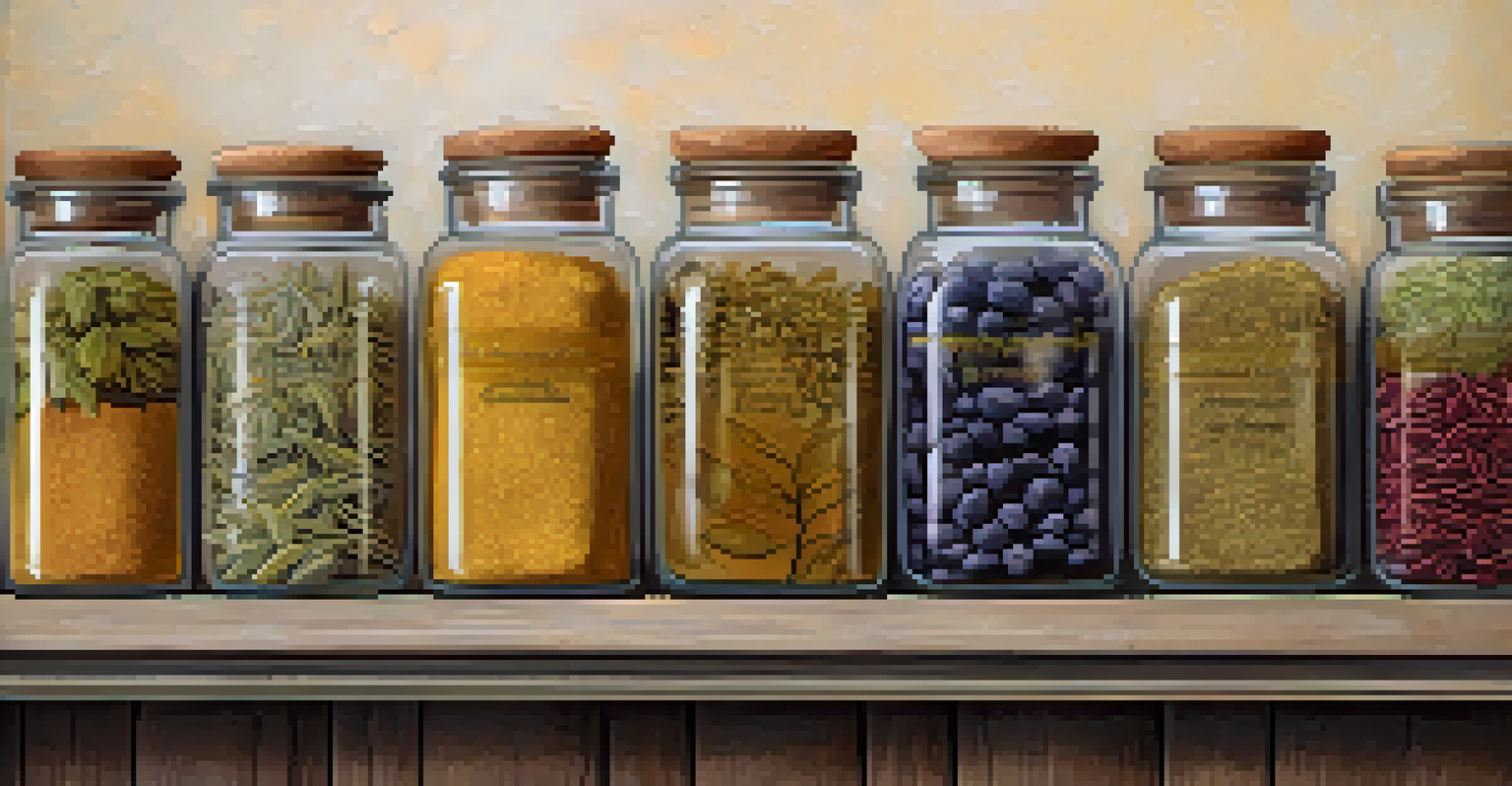The Role of Herbal Remedies in Emotional Healing

Understanding Emotional Healing and Its Importance
Emotional healing is a journey toward recovering from pain, trauma, and stress. It allows individuals to process their feelings and regain a sense of balance in life. This healing is crucial not only for mental well-being but also for overall physical health, as emotional states can impact bodily functions.
The greatest weapon against stress is our ability to choose one thought over another.
Many people might overlook the role of emotional health, often prioritizing physical ailments instead. However, emotional wounds can manifest in physical symptoms, leading to a cycle of discomfort. By addressing emotional issues, we can improve both our mental and physical states.
Herbal remedies have emerged as a popular option for supporting emotional healing. They offer a natural alternative to conventional treatments, often with fewer side effects. Understanding their benefits can empower individuals on their healing journeys.
Common Herbal Remedies for Emotional Support
Several herbs are renowned for their potential to support emotional health. For instance, St. John's Wort is widely recognized for its use in alleviating mild to moderate depression. Similarly, chamomile is often used for its calming effects, helping to reduce anxiety and promote relaxation.

Another popular option is passionflower, known for its ability to ease feelings of restlessness and anxiety. Its soothing properties make it a favorite for those looking to unwind after a stressful day. Additionally, ashwagandha is gaining attention for its adaptogenic qualities, helping the body manage stress more effectively.
Emotional Healing's Vital Role
Emotional healing is essential for both mental and physical well-being, as unresolved emotional issues can manifest in physical symptoms.
Incorporating these herbs into daily routines can be as simple as brewing a calming tea or taking supplements. However, it's important to consult with a healthcare provider before starting any new herbal regimen, especially if you're on medication.
The Science Behind Herbal Remedies and Emotions
While herbal remedies have been used for centuries, modern science is beginning to validate their effects on emotional health. Research has shown that certain compounds in plants can influence neurotransmitter activity, which plays a key role in mood regulation. For example, the hypericin in St. John's Wort is thought to impact serotonin levels, thus helping alleviate depression.
Herbs are the friend of the physician and the pride of the wise.
Moreover, studies suggest that herbs like valerian root can enhance sleep quality, which is crucial for emotional resilience. Good sleep is linked to better mood regulation, making valerian a valuable ally for those experiencing anxiety or stress.
Understanding the biochemical interactions between herbs and our body can demystify their effects. This knowledge empowers individuals to make informed choices about their emotional healing process, blending traditional wisdom with modern science.
Incorporating Herbal Remedies into Daily Life
Integrating herbal remedies into daily life can be a seamless process. Start by identifying specific emotional challenges you wish to address, whether it’s stress, anxiety, or depression. This clarity will help guide your choices in selecting the right herbs for your needs.
You might consider starting your day with a cup of green tea, which contains L-theanine, known for its calming properties. Alternatively, incorporating a calming chamomile tea into your evening routine can help signal to your body that it's time to wind down.
Herbal Remedies for Support
Herbs like St. John's Wort and chamomile can provide natural support for emotional health, helping alleviate symptoms of anxiety and depression.
Additionally, using essential oils derived from herbs can provide emotional support through aromatherapy. Scents like lavender are not only pleasant but can help reduce anxiety and promote a sense of calm, making them a great addition to your self-care rituals.
Safety Considerations with Herbal Remedies
While herbal remedies can offer tremendous benefits, it's important to approach them with caution. Not all herbs are suitable for everyone, and some may interact negatively with prescription medications. For instance, St. John's Wort can interfere with antidepressants and birth control pills, so it's essential to consult a healthcare professional.
Additionally, quality matters when selecting herbal products. Look for reputable brands that provide transparency about their sourcing and manufacturing processes. Supplements should ideally be standardized for active ingredients, ensuring you're getting the right dosage.
Being informed about potential side effects is also crucial. Although herbs are natural, they can still cause adverse reactions in some individuals. Keeping a journal of how you feel when trying new remedies can help track their effects and guide future choices.
Real-Life Success Stories with Herbal Remedies
Many individuals have found success in managing their emotional health through herbal remedies. For instance, someone struggling with chronic anxiety may share how incorporating passionflower tea into their routine helped them feel more grounded and calm during stressful situations. These personal stories highlight the potential impact of herbs on emotional well-being.
Another anecdote might involve a person dealing with seasonal depression who found relief through St. John's Wort. By regularly including this herb in their diet, they began to notice a gradual improvement in their mood and overall outlook on life, showcasing the power of nature in healing.
Integrate Herbs with Professional Help
Combining herbal remedies with professional mental health support creates a holistic approach to emotional healing, enhancing overall well-being.
These stories remind us that while herbal remedies can be effective, results can vary. Each person's experience is unique, and finding what works best for you may involve some experimentation and patience.
Balancing Herbal Remedies with Professional Support
While herbal remedies can be beneficial, they should not replace professional mental health support when needed. Integrating herbal solutions with therapy or counseling can create a holistic approach to emotional healing. Mental health professionals can provide guidance, coping strategies, and support as you explore herbal options.
Consider discussing your interest in herbal remedies with your therapist or doctor. They can help you navigate which herbs may complement your treatment plan and ensure you're making safe choices.

Ultimately, the journey of emotional healing is personal and multifaceted. By combining the wisdom of herbal remedies with professional guidance, individuals can create a supportive environment for their emotional well-being.